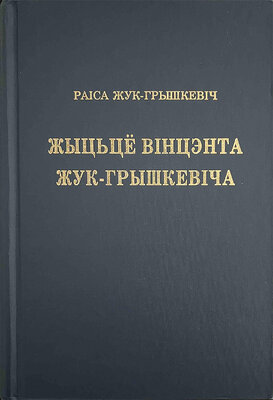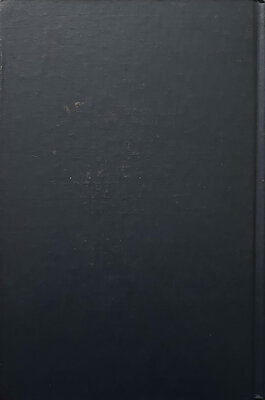Жыцьцё Вінцэнта Жук-Грышкевіча
Раіса Жук-Грышкевіч
Памер: 798с.
Таронта 1993
215
Toronto. In London there are many old Byelorussian immigrants. Not all of them know very much about Byelorussia but they are interested.
Michas Kulesh told about many of the old immigrants from Byelorussia in Toronto. He is a member of ZBK. He came to Canada in 1947 from Germany and lives in Toronto. He married the daughter of an old immigrant from Byelorussia. His father-in-law is Jarmalej Bajesko who came to Canada in 1911 from the township of Puchaviskaj, county of Slucak and Minsk province. There are many Byelorussians in Canada from this area. He settled in Toronto. He worked as a pressman for 35 years and then was a cleaner. He had a store and his own home, and was comfortably off. In 1924 he brought his wife from home to Canada. He praised his life in Canada and the Canadians. He did not belong to any organizations except the Russian Church on Glenmorris. He felt he was a Byelorussian and although he did not join any Byelorussian organization, he felt sympathy to ZBK.
Budzka, Ihnat from the township of Puchavickaj, county of Slucak emigrated in 1908 to the U.S.A. In 1909 he came to Canada and settled in Toronto. He is now 80 years old. He at one time felt sympathetic to the Soviets but later was interested only in religious life. He knows he is a Byelorussian and speaks Byelorussian at home. His daughter is a ballerina and danced at BNA.
Alaksej Budzka came to Canada from the Puchavickaj region in 1914. His uncle mentioned above sponsored him. He came to Canada when he was 15 years old. He learned to manufacture toys and started a business in Toronto. He later sold his business and worked in the same field. He is a wealthy man. He has a son Luka who graduated as an engineer. They speak Byelorussian at home and read Byelorussian newspapers, but he was not active in organized clubs. At one time when it was suggested to Luka that he anglo-saxonize his name, he became highly indignant and refused, even though a very good job was offered if he would. Alaksej Budzka felt sympathetic to the Communists but his wife and sons were against them. They feel more sympathetic to Byelorussias and their organizations.
Nikanor and Symon Pranovicy came to Canada in 1910 also from the township of Puchavickaj, county of Sluck. They settled in Toronto. Both are now pensioners and married. Nikanor worked as a presser. Symon worked in a paper mill and besides this he bought and sold homes. He bacame a wealthy man. At home they all spoke Byelorussian. Nikanor 216
has a son who is the owner of a sewing machine store. The Communists have tried to influence them but they do not belong to the organization on Denison St. The Communists failed to have any influence on them because they found from letters which they received from the homeland that the facts that were presented to them by the Communists were untrue and things were not as good as they said.
Michael Koron came to Canada in 1911. He was also from the province of Puchavickaj settled in Toronto, and has a family. His wife is from the region of Pinsk. At home they speak Byelorussian. They cared about the education of their children and one son is an engineer. Michael Koron worked as a coater feeder in a metal plant. He was influenced by the Communists but his son was very much against them.
Peter Spakowsky came from West Byelorussia in 1911 to Toronto. He worked as a presser in a clothing factory. He married a girl from Byelorussia and they had one son. They spoke Byelorussian in the home. They were mainly interested in the religious life. He was a Catholic while she was Orthodox, but they both attended the Russian Orthodox Church.
Alaksandar Sinica came from the district of Pastavy, province of Vilna. He came to Canada in 1930 and settled in Toronto. He works in a steel foundry. His wife is the daughter of the above-mentioned Ihnat Budzka. They have one daughter who graduated from the Faculty of Law and is a lawer in a government office. They are conscious of being Byelorussians, but are not active.
In conclusion, Mr. Kulesh thinks that the above-mentioned people and many others could contribute more to Canada and our ethnic group if they were not influenced by Denison Ave. However, this influence is diminishing.”
“Ottawa, February 25, 1959
Dr. V. Zuk
54 Mary Street
Barrie, Ontario
Dear Dr. Zuk:
Part II of your letter dated February 18 contained very useful material on Byelorussians in Canada. I shall make a trans-
217
lation of the memoirs from Toronto and add them to the monograph as an appendix.
I shall write as you suggest to the various persons whose addresses you have given me in your letter. I enclose a copy of one of those letters for your information. I am also enclosing draft of three chapters of the proposed monograph with a request to make such observations, additions or corrections as you may deem proper and to return them to me. The monograph is intended to give a clear picture of the historical facts of the present situation of the Byelorussian group regardless of group interests or personal differences among the various leaders. We would like to present an unbiased picture of the process of settlement of the Byelorussian group in Canada and its integration into Canadian life.
Once more, many thanks for your valuable assistance.
Yours sincerely,
(Dr.) V. J. Kaye,
National Liaison Officer.”
«Бэры, 10 сакавіка, 1959.
Вельмі Паважаны й Дарагі др. Кэйэ,
... Цяпер пераходжу да Вашых тэкстаў. Перадусім пра-шу Вас узяць пад увагу наступныя факты:
1. У Канадзе звычайна акрэсьліваюць нацыяналь-насьць (ці этнічную прыналежнасьць) паводле дзяржавы, у якой жыў імігрант перад прыездам у Канаду.
2. Пры перапісях насельніцтва для нацыянальнай, ці этнічнай прыналежнасьці бралася пад увагу дзяржаўная прыналежнасьць. За малымі выняткамі — на гэтай жа аснове была ўложана ліста нацыянальных рубрык. Можна было падаваць пры перапісі нацыянальнасьць іншую, чымся дзяржаўная прыналежнасьць па дакумэнтах, але толькі ў тым выпадку, калі гэта нацыянальнасьць была ў лісьце нацыянальных рубрык. Калі-ж такой нацыяналь-насьці ў пералічаных у лісьце нацыянальных рубрык ня было - дык урадавец запісваў нацыянальнасьць паводле дзяржаўнай прыналежнасьці. Як ведама, беларусы ня ме-
218
лі сваёй дзяржавы (калі ня лічыць існуючай некалькі ме-сяцоў БНР ці Беларускай ССР) і ў сьпісе рубрык нацыя-нальнасьцяў беларускай рубрыкі ня было. Таму пры пера-пісях беларусы, як правіла, траплялі ў чужую рубрыку на-цыянальнасьці - пераважна расейскую ці польскую. Туды трапілі нават сьведамыя нацыянальна беларусы - як з старой так і з новай эміграцыі. Дзеля таго можа было-б няслушным цьвердзіць, што беларусы трапілі ў чужыя рубрыкі толькі з тэй прычыны, што ня ведалі, што яны беларусы.
3. У Нямеччыне ў 1945-46 годзе альянцкія вайсковыя ўлады сілай выдавалі бальшавіком беларускіх і не белару-скіх уцекачоў, тых, што паходзілі з тэрыторыі Савецкага Саюзу. Каб ратавацца ад гэтага,беларусы ня мелі іншага выбару, як ісьці ў польскія лягеры й падавацца за паля-каў, або літоўскія, ці латышскія. Там пры скрынінгах яны падавалі за сваю нацыянальнасьць лягеру, у якім яны былі. 3 гэтымі дакумэнтамі пад чужой нацыяналь-насьцяй беларусы маглі ўтрымацца ад выдачы бальша-віцкім рэпатрыяцыйным місіям, бо палякаў, літоўцаў ці латышоў насільна не рэпатрыявалі. 3 такімі дакумэнтамі пад чужой нацыянальнасьцяй беларусы эмігравалі ў роз-ныя краіны, у тым ліку й Канаду. Настрашаныя рэпат-рыяцыйнымі камісіямі, яны доўга сядзелі ціха, баючыся выявіць сваю сапраўдную нацыянальнасьць. Пазьней, калі небясьпека выдачы бальшавіком мінула, зьявіліся іншыя перашкоды пры перапісі падаць сваю сапраўдную нацыя-нальнасьць. Калі беларусы цьвердзілі, што яны беларусы, і дамагаліся, каб іх запісвалі такімі - урадаўцы адказвалі, што яны такой нацыянальнасьці ня знаюць, яе няма ў лісьце нацыянальнасьцяў і запісвалі пад рубрыкай расей-скай ці польскай - у залежнасьці ад таго, зь якой часткі Беларусі гэтыя людзі паходзілі, або якая нацыянальнасьць запісана ў іх у дакумэнтах. Такім чынам, беларусы запіса-ны ня толькі пад рубрыкай расейскай ці польскай, але нават пад літоўскай і латышскай. Тыя-ж настойлівыя, што ні за што не згаджаліся быць запісаны пад чужой на-цыянальнасьцяй - дабіваліся ўрэшце толькі таго, што іх запісвалі на асобным лістку. Такая гісторыя была са мной і шмат якімі іншымі беларусамі. Але што яны рабілі з гэ-тымі асобнымі лісткамі, ці анатацыямі - цяжка сказаць.
Я памятаю, што ў часе перапісу было страшэннае абу-рэньне ў беларускіх асяродзьдзях на тое, што ў лісьце на-
219
цыянальнасьцяў ня было беларускай рубрыкі. I сапраўды, падумайце толькі, як гэтыя людзі маглі чуцца: на баць-каўшчыне адбіралі ім іхнюю нацыянальнасьць акупанты - расейцы й палякі; у Нямеччыне іх як беларусаў аліянц-кія ўлады выдавалі насільна бальшавіком; а як прыехалі ў вольную краіну ў Канаду, дзе ўрэшце думалі быць самі-мі сабой - дык і тут сілай фактаў змушалі іх запісвацца пад чужой нацыянальнасьцяй, найчасьцей іхніх ворагаў -расейцаў ці палякаў. Гэта-ж страшэнная людзкая крыўда! Гэта-ж проста дыскрымінацыя!
Таму нашы арганізацыі зрабілі пэўныя крокі перад канадыйскімі ўладамі, каб гэту крыўду направіць, каб бе-ларусаў запісвалі беларусамі. I таму гэтыя ўлады далі за-пэўненьне, што беларуская нацыянальнасьць прызнаецца, і беларусы будуць запісаны пад сваёй рубрыкай нацыя-нальнасьці. Але, як я бачу з Вашых лістоў, беларусы ў Ка-надзе ня прызнаны дагэтуль за асобную нацыянальнасьць і ня маюць сваёй нацыянальнай рубрыкі пры перапісах насельніцтва. А калі так, дык будзьце ласкавы, парадзьце, што рабіць, да каго зьвяртацца, каб паправіць гэту крыў-Дў?
Паданыя тут факты варта было-б насьветліць і зрабіць зь іх выснавы.
Да разьдзелу
“Beginning of Byelorussian immigration to Canada”
Тут якраз, па мойму, можна было-б сказаць, чаму бела-русы былі ўцягнуты ў рубрыкі нацыянальнасьцяў расей-скай і польскай, бяручы пад увагу вышэй паданыя фак-ты, а ня толькі дзеля таго, што па сваей нацыянальнай нясьведамасьці ўважалі сябе за расейцаў ці палякаў. Зга-джаюся, што пэўная частка была такіх, але-ж былі й на-цыянальна сьведамыя, і яны ўсяроўна былі запісаны пад чужымі рубрыкамі. Гэта адносіцца ня толькі да новай эміграцыі, але й да старой, бо й сярод старой эміграцыі былі й ёсьць сьведамыя беларусы, хоць пэўне-ж у мен-шым ліку, як сярод новай. I напэўна, калі-б пры перапі-сах існавала рубрыка беларускай нацыянальнасьці, дык напэўна шмат якія й старыя эмігранты запісаліся-б пад сваёй рубрыкай.
 КНІГІ ОНЛАЙН
КНІГІ ОНЛАЙН


